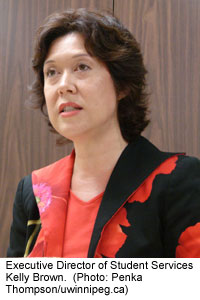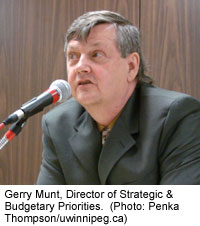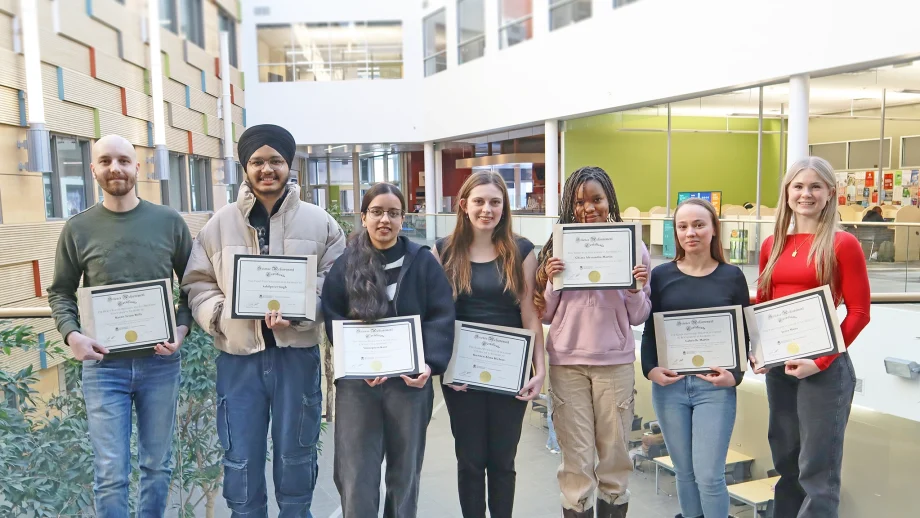 WINNIPEG, MB – The University of Winnipeg’s Access Task Force (ATF) today released its final report containing 16 initiatives to improve access to post-secondary education for low-income individuals. The group also outlined an action plan for the next 18-24 months to deliver these initiatives.
WINNIPEG, MB – The University of Winnipeg’s Access Task Force (ATF) today released its final report containing 16 initiatives to improve access to post-secondary education for low-income individuals. The group also outlined an action plan for the next 18-24 months to deliver these initiatives.
The ATF’s recommendations include:
- Establishing an Opportunity Fund to provide seed money for students
- Creating a tuition credits program to be integrated with community programs in the university’s Innovative Learning Centre, which the University has already begun to implement
- Developing a program through the proposed College for Adult Learning that will allow adult learners to achieve a university degree without setting foot on campus between 8:30 am and 4:30 pm
- Experimenting with new approaches to academic programs – such as the new Urban & Inner-City Studies major – so that these programs are more accessible to non-traditional students
“The Access Task Force has made a set of recommendations that fundamentally changes the idea of how we should provide accessibility to university,” said University of Winnipeg President & Vice-Chancellor Dr. Lloyd Axworthy, who commissioned the ATF on behalf of the university. “The initiatives are a call to action to the university, governments and community groups to make a difference in the lives of others.”
The Access Task Force – led by Executive Director of Student Services Kelly Brown and Director of Strategic & Budgetary Priorities Gerry Munt – began its work in October 2006 to determine how UWinnipeg could be an agent of change in removing barriers that prevent those in traditionally under-represented groups from participating in post-secondary education.
The Task Force included a team of students, faculty members and administrators to work on this challenge. The ATF also solicited input from the broader community within and outside of the university, including general forums with individuals and groups. The task force issued an interim report in March 2007 that posed key questions relating to the issue of post-secondary accessibility. The initiatives in today’s final report serve as responses to those questions.
“I would like to thank all of those who took part in developing this report. The clear message that the task force heard is that the university must serve as a catalyst for change in the inner-city community,” Dr. Axworthy added. “The needs in the community have shifted and our programming as well as our approach to programming must change to meet those needs.”
Axworthy also announced that the University is beginning to implement Opportunity Bursaries to both part-time and full-time students, and will be awarded to applicants who show academic promise and financial need and come from a student group currently under-represented at The University of Winnipeg. He also said the University has begun to implement on a pilot basis the tuition credits program. These bursaries will augment traditional student awards by covering critical needs such as emergency childcare, food, and shelter. This support can potentially mean the difference between a student leaving university or graduating with a degree. As well, support for entry-level students through an expanded Transition Year Program will help ensure that students have the skills and resources they need to succeed at university.
A full copy of the Access Task Force report is available at the University’s website at http://www.uwinnipeg.ca/index/access-task-force
– 30 –
Located in the heart of downtown, The University of Winnipeg is a compact, diverse, multi-cultural academic community committed to access and excellence. Home to more than 9,200 full- and part-time students, UWinnipeg has been ranked by our graduates in the Top-10 of all Canadian universities when asked about their “Entire Educational Experience” (MacLean’s Graduate Survey, June 2006). The Globe & Mail Report Card 2006 gives the University of Winnipeg an overall “A” grade in the areas of quality of education, teaching quality, class sizes, faculty-student interaction and the availability of faculty outside of classroom hours. Find out why. Visit www.uwinnipeg.ca.
FOR MORE INFORMATION
Ilana Simon, Communications Officer, University of Winnipeg
P: 204.786.9930, C: 204.782.3279, E: i.simon@uwinnipeg.ca





